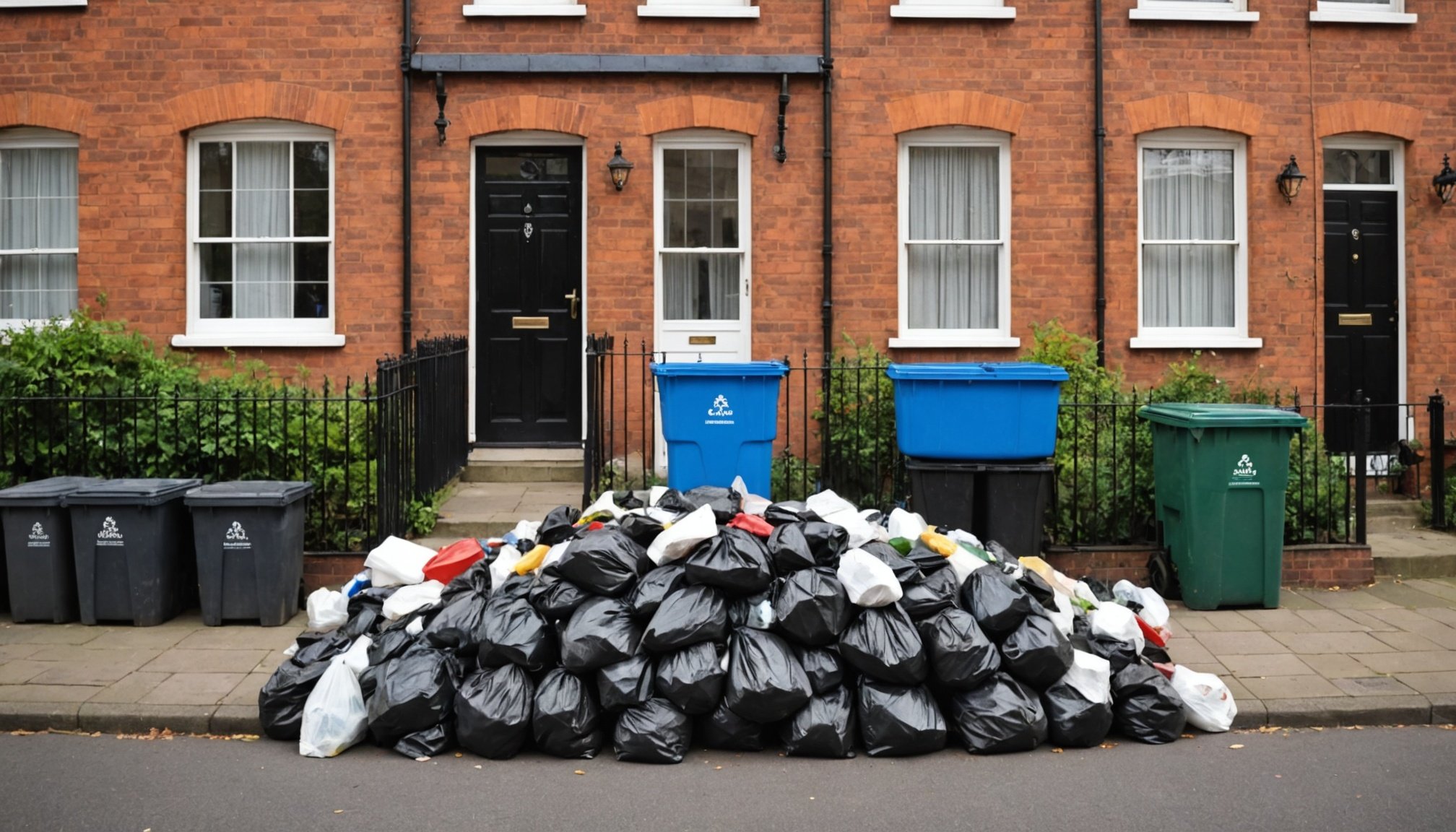Urban living in the UK is synonymous with convenience, but it often leads to increased household waste. Effective waste management requires innovative strategies that reflect the unique challenges of city life. From composting in compact spaces to embracing minimalist living, these smart approaches foster sustainability while improving your quality of life. Discover how small changes can make a significant difference, allowing you to reduce your environmental footprint and contribute positively to your community. Explore these actionable strategies and boost your household's eco-friendly efforts today.
Understanding Household Waste in Urban UK
In urban areas across the UK, household waste management is a pressing concern. The sheer volume of waste generated poses significant challenges. Cities like London and Manchester produce staggering amounts of waste annually. For instance, London alone generates over 3.7 million tonnes of waste each year. This highlights the critical need for efficient waste management systems.
Sujet a lire : Unlocking Fresh Air: Proven Natural Ventilation Strategies to Eliminate Dampness in UK Basements
The environmental impact of excessive waste is profound. Landfills, a common disposal method, contribute to greenhouse gas emissions, particularly methane. This not only exacerbates climate change but also affects local ecosystems. Moreover, improper waste management can lead to pollution of air, water, and soil, impacting urban health and biodiversity.
Urban waste statistics reveal alarming trends. In 2022, UK cities collectively generated approximately 26 million tonnes of waste. This figure underscores the urgency for sustainable practices. Recycling rates, though improving, still require significant enhancement to mitigate environmental damage. In urban areas, only about 44% of waste is recycled, indicating room for improvement.
A voir aussi : Transforming Historic Spaces: A Guide to Designing Wheelchair-Accessible Bathrooms in UK Heritage Buildings
Addressing these issues requires a multifaceted approach, involving government policies, technological innovations, and public awareness campaigns. By understanding the scale and impact of household waste, urban areas can develop more effective strategies to manage waste sustainably.
Effective Recycling Practices
In the quest for sustainable waste management, understanding local recycling guidelines is paramount. Each urban area in the UK has specific regulations that dictate how materials should be sorted and disposed of. Familiarising oneself with these rules can significantly enhance recycling efficiency.
Common Recyclable Materials
Knowing what can be recycled is crucial. Materials such as paper, cardboard, glass, and certain plastics are typically recyclable. However, it's essential to check local guidelines, as not all plastics are accepted everywhere. Proper disposal involves rinsing containers to remove food residue, which can lead to contamination if left unchecked.
Avoiding Contamination
Contamination in recycling bins is a prevalent issue that can render entire batches of recyclables unusable. To avoid this, follow these strategies:
- Separate materials: Ensure recyclables are sorted according to local guidelines.
- Clean items: Rinse food and drink containers thoroughly.
- Avoid bagging: Place recyclables directly in the bin without plastic bags unless specified otherwise.
By adhering to these recycling methods, individuals can contribute to more effective waste management. This not only helps in reducing the environmental impact but also supports the broader goal of increasing recycling rates across urban UK areas.
Composting Solutions for Urban Dwellings
Urban composting offers a sustainable way for city dwellers to manage organic waste, transforming it into valuable nutrient-rich soil. Benefits of composting include reducing landfill contributions and greenhouse gas emissions, while also enriching garden soil for those with green spaces. For urban households with limited space, there are several composting methods that can be effectively employed.
Suitable Composting Methods
For those living in apartments or small homes, vermicomposting is an excellent option. This method uses worms to break down organic material quickly and efficiently, producing rich compost known as worm castings. Another space-saving solution is bokashi composting, which involves fermenting waste in an airtight container. This method is particularly suitable for indoor use, as it minimizes odours and speeds up the composting process.
Resources for Starting a Compost System
Numerous resources are available to help city residents start their composting journey. Local councils often provide guidance and sometimes even subsidized composting bins. Community gardens and urban farms can also offer support and advice. By leveraging these resources, urban dwellers can easily integrate composting into their waste management practices, contributing positively to the environment.
Reducing Single-Use Items
The proliferation of single-use plastics significantly contributes to urban waste challenges. These items, often used once and discarded, accumulate rapidly in landfills and oceans, exacerbating environmental issues. Transitioning to sustainable alternatives is crucial for mitigating this impact.
Practical Alternatives to Single-Use Products
Adopting eco-friendly products can make a substantial difference. For instance, replacing plastic water bottles with reusable ones reduces waste and saves money over time. Similarly, using cloth bags instead of plastic ones for shopping can significantly cut down plastic consumption. Opting for bamboo or metal straws over plastic ones is another simple yet effective change.
Tips for Adopting a Zero-Waste Lifestyle
Embracing a zero-waste lifestyle involves mindful choices. Begin by conducting a waste audit to identify the most common single-use items in your daily routine. Then, gradually replace these with sustainable alternatives. For example, carry a set of reusable cutlery and containers to avoid disposable options when dining out. Additionally, support brands that prioritise eco-friendly packaging and products. By making these conscious choices, individuals can play a pivotal role in reducing urban waste and promoting environmental sustainability.
Local Initiatives and Community Programs
Urban areas in the UK are seeing a rise in community waste reduction programs and local sustainability initiatives. These efforts are crucial for managing the significant waste produced in cities. By participating in these programs, residents can actively contribute to reducing their environmental footprint and fostering a more sustainable community.
Getting Involved in Community Programs
Engagement in urban recycling networks is a practical starting point. Many cities offer workshops and events that educate the public on recycling best practices and waste reduction techniques. Residents can join local groups or councils focused on sustainability to stay informed about upcoming initiatives and volunteer opportunities.
Successful Case Studies
Numerous cities have implemented successful strategies for urban waste minimization. For instance, Bristol's community-led recycling project has significantly increased local recycling rates. Similarly, Brighton's zero-waste initiative has encouraged businesses and residents to adopt more sustainable practices, reducing overall waste production. These examples demonstrate the effectiveness of local efforts in driving positive environmental change.
By participating in these community programs, individuals can play an active role in enhancing urban sustainability. This collective effort not only benefits the environment but also strengthens community bonds and promotes a culture of responsibility and awareness.
Smart Shopping Strategies
Embracing sustainable shopping habits can significantly reduce household waste and environmental impact. By prioritising eco-friendly choices, consumers can contribute to a more sustainable future.
Principles of Sustainable Shopping
To minimise waste, focus on purchasing only what is necessary. This involves planning meals in advance and creating a shopping list to avoid impulse buys. Opt for products with minimal packaging or those that are recyclable or compostable. Supporting eco-conscious brands that prioritise sustainability in their production processes can also make a notable difference. These brands often use renewable resources and ethical practices, ensuring a lower environmental footprint.
Benefits of Bulk Buying
Buying in bulk is a practical strategy for reducing packaging waste. It allows consumers to purchase larger quantities of products, often at a reduced cost per unit. This not only saves money but also reduces the frequency of shopping trips, lowering carbon emissions associated with transportation. Bulk buying is particularly effective when combined with meal planning, ensuring efficient use of purchased items and minimising food waste.
By adopting these smart shopping strategies, individuals can play a pivotal role in promoting environmental sustainability while enjoying the benefits of cost savings and resource efficiency.
Managing Food Waste Effectively
Reducing food waste in urban households is crucial for sustainability. Implementing food waste reduction strategies can significantly lessen environmental impact. Start with meal planning: create a weekly menu to guide purchases, ensuring you buy only what you need. This prevents overbuying and reduces spoilage.
Portion control is another effective tactic. By preparing appropriate serving sizes, you minimise leftovers, which often end up as waste. Consider using smaller plates to naturally limit portions and prevent food from being discarded.
Food preservation techniques play a vital role in extending the shelf life of perishable items. For instance, freezing leftovers or surplus produce can keep them fresh for months. Additionally, storing food correctly—such as keeping fruits and vegetables in the fridge’s crisper drawer—maintains their quality longer.
Incorporating these practices into daily routines not only helps in food waste reduction but also saves money and resources. By being mindful of food consumption and storage, urban households can make a significant difference in managing waste effectively. This approach supports broader environmental goals and promotes a sustainable lifestyle.
Challenges of Urban Waste Management
Urban areas face distinct waste management challenges that complicate sustainability efforts. One primary issue is space limitations. With dense populations and limited land, cities struggle to allocate areas for waste processing and recycling facilities. This constraint often leads to reliance on distant landfills, increasing transportation emissions and costs.
Policy issues further exacerbate these challenges. Inconsistent regulations across different regions can create confusion and inefficiencies. For instance, variations in recycling guidelines may lead to improper sorting, resulting in contamination and reduced recycling effectiveness. Additionally, urban policies may not adequately incentivise sustainable practices, leaving gaps in waste reduction efforts.
Urban households also encounter unique obstacles in managing waste. Limited indoor and outdoor space restricts the ability to segregate and store recyclables or compost materials. This often results in higher reliance on single-use items and increased waste generation.
Addressing these urban waste challenges requires coordinated efforts from local governments and communities. Implementing uniform policies, enhancing public awareness, and investing in innovative waste management solutions can alleviate these issues. By tackling space and policy constraints, urban areas can improve their waste management practices and move towards a more sustainable future.












